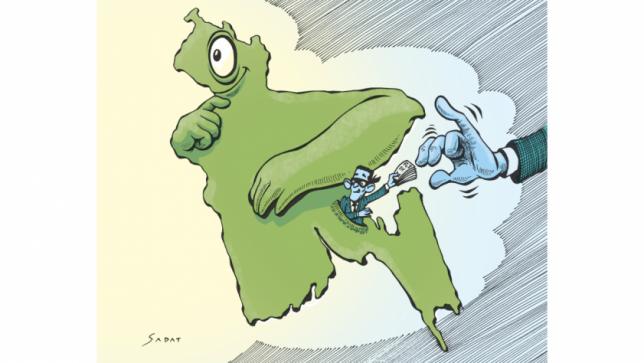Bangladeshis and Indians are going in the opposite directions with regard to stashing money in Switzerland banks -- the former's, a far smaller economy, is going up while the latter's is on the decline.
For example, Bangladeshis deposited Tk 1, 281 crore in 2009, Tk 1961 in 2012 and Tk 3,149 crore in 2013 with Swiss banks. The amount rose to Tk 4, 730 crore in 2015 and Tk 5, 685 crore last year.
In contrast, Indians' money in Swiss banks hit a record low last year, according to the Swiss National Bank's latest report, totaling Rs 4, 500 crore today, declining from Rs 23,000 crore in 2006.
This record tells a story of how effective, or the lack there of, the anti-money laundering efforts by the two governments has been.
India's success did not come automatically, nor did it get any favour from the Swiss banks. It rather came as a result of a continued clampdown on black money stashed behind Swiss banks' famed secrecy walls.
The Indian government has been fighting the black money menace for a decade through various means, according to The Economic Times in a report on June 30.
“A number of strategies have been deployed by the government to combat the stash-funds menace, in both overseas domestic domain, which include enactment of a new law to tackle stashing of black money abroad, amendments in the anti-money laundering Act and compliance windows for people to declare their hidden assets," said the Indian leading business newspaper.
Switzerland has already begun sharing foreign client details on evidence of wrongdoing. It has agreed to further expand its cooperation on India's fight against black money with a new pact for automatic information exchange from next year.
The Economic Times said there have been several rounds of discussions between Indian and Swiss government officials on the new framework and also for expediting the pending information requests about suspected illicit accounts of Indians in Swiss banks.
In June, Switzerland ratified automatic exchange of financial account information with India and 40 other countries to facilitate immediate sharing of details about suspected black money even as it sought strict adherence to confidentially and data security.
India has also constituted a Special Investigation Team to probe cases of alleged black money of Indians, including funds deposited with banks in Switzerland and in other places abroad, said The Economic Times.
Pakistan also started negotiation with the Swiss authorities to fight money laundering. Its efforts seem to be working.
Pakistani nationals' deposits in Swiss banks declined to Rs 9,500 crore in 2016 from Rs 10,000 crore in 2015. For the last few years, the Pakistan government has negotiated with the Swiss authorities and signed an agreement with them to get information about the country's account-holders in Swiss banks.
In March, the Pakistan government signed a revised pact with Switzerland to improve bilateral exchange of information regarding Swiss bank accounts.
On the other hand, the continuous rise in deposits by Bangladeshis in Swiss banks questions the effectiveness of our mechanism to fight money laundering.
The latest disclosure that Bangladeshis deposited 20 percent more money with Swiss banks than the previous year could not draw much attention of the government policymakers.
This spike is despite an ongoing global clampdown on the secrecy of Swiss banking system.
Speaking at the Jatiya Sangsad on June 6, Finance Minister AMA Muhith also acknowledged that huge sums were flowing out of the country but in the same breath said it was not possible to stop the outflow fully.
“What we can do is lower the opportunity for siphoning off money. That means taking measures to stop generation of black money.”
The government is taking steps in this regard, which would be visible next month, the minister said.
His remarks raised questions about the government's seriousness to check stashing of money in Swiss banks. What did his ministry do in the last eight years under his leadership as he has been the finance minister since 2009?
Over the past few years, the Bangladesh Bank has repeatedly claimed to have taken initiatives to bring back money from the Swiss banks. But it did not come up with any news of actually bringing any money back. Rather the constant rise in the deposits with Swiss banks shows nothing has been done.
We have enacted the anti-money laundering law in 2012. But its effective implementation has not been possible. There is no record about our government's making a successful effort to negotiate with Swiss authorities to collect information about Bangladeshi's account holders in Swiss banks.
According to legal experts, our government can use international law to collect information about Bangladeshis who parked their illicit money in Swiss banks. If needed, it may sign agreements with the bank authorities in this regard.
Our policymakers should give a careful thought to ways and means the Indian government has been applying to check stashing money in Swiss banks.
It keeps collecting information about the country's account holders with Swiss banks. It has had hectic negotiation with the Swiss authorities to bring back the money from the country.
The Indian example may show us the way to strengthen the fight against money laundering. For this, the government must be serious. But the question is: Is the government at all serious?
news:daily sun/3-jul-2017




 Abdus Samad Labu, Chairman of Al-Arafah Islami Bank Limited, handing over crests and certificates to its officials at the bank\'s head office in the city on Sunday. Total 38 executives and officers of the bank awarded for their outstanding performance und
Abdus Samad Labu, Chairman of Al-Arafah Islami Bank Limited, handing over crests and certificates to its officials at the bank\'s head office in the city on Sunday. Total 38 executives and officers of the bank awarded for their outstanding performance und Ali Reza Iftekhar, Managing Director and CEO of
Ali Reza Iftekhar, Managing Director and CEO of